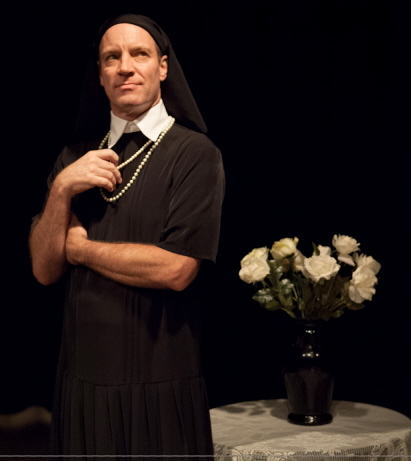 By Bill Hirschman
By Bill Hirschman
Audiences often marvel at actors’ ability to memorize long speeches and complex dialogue. But few memorization jobs are as daunting as that of I Am My Own Wife.
When Tom Wahl stands alone for two hours in the spotlight in Zoetic Stage’s production this week, he not only portrays the elderly German transvestite Charlotte von Mahlsdorf, but a gallery of 36 distinct, disparate characters (or is it 37 or 34; Wahl and director Stuart Meltzer aren’t sure).
Usually, it’s difficult to act with no other scene partner to feed off of. But this time, Wahl quipped sardonically, “I’m playing so many different characters, it’s like the room is being inhabited by other people.”
But before designing the look and sound of that population, there was simply the challenge of getting the words down. Wahl took no chances; he began three months ago.
“Luckily, I had the script in plenty of time,” said Wahl, a tall, slender actor with fair hair, a gentle demeanor and a ready laugh, “When you first read it, it’s so massive, it’s an impossibility. You just sit down with the script and literally do it one word at a time, one line at a time. Other days, I’ll work on one paragraph and that will take me three hours…. When I have a section that I think I have under my belt, I’ll run it with somebody else, or in this case, just have somebody hold the book…. And three months later, hopefully, you’re ready.”
Meltzer chimed in, “And there are a lot of German phrases and words.” Of course, Wahl does not speak German.
But in performance, the problem is not the words so much as the stamina. “It takes an incredible amount of concentration and focus and energy to stay in it all the time,” Wahl said. “If you’re not in every moment of the journey, then you can drift off.”
I Am My Own Wife is the 2003 script that is loosely based on playwright Doug Wright’s true life three-year pursuit of von Mahsdorf’s astounding story: a man who killed his father, became transgendered as an adult, pursued a career as an antiquarian and survived the Third Reich and the Communist occupation of East Berlin by steadfastly assuming her identity as a woman. Wahl plays not only the 65-year-old person who Wright interviewed after the fall of the Berlin Wall, but Wright who narrates the play and the procession of major and minor characters in Charlotte’s life.
Von Mahlsdorf became famous for almost obsessively collecting and preserving antique furniture, photographs, miniatures and uncounted clocks, eventually creating a cultural museum.
Meltzer, artistic director of the fledgling Zoetic Stage, did not see the original production in New York, where he was a graduate student, that won the Tony Award and Pulitzer in 2004 nor the road tour that played the Coconut Grove Playhouse in 2006.
But he read the play after the script won award after award. It burrowed into the back of his mind. Years later, he told Wahl that he thought the actor would be perfect for the part.
The project nagged at him when Meltzer helped found the Zoetic collective of other directors, playwrights and actors including Wahl to form a loose-knit company in 2010. At the same time, the project dovetailed with a larger arts festival called Light/The Holocaust & Humanity Project, spearheaded by Scott Shiller, executive vice president of the Arsht Center for the Performing Arts where Zoetic is based. When it turned out Shiller was a big fan of the play, the deal was set.
“It just seemed like a kismet opportunity,” Meltzer said,
What convinced Wahl to take it on? “Well, I had an open time slot,” he said dryly, making fun of an actor’s anxiety over always looking for the next job. “I’ve never done a one-person show and I’m normally not a big fan for one-person shows, but this one stars me, so I love it.”
But seriously. “It’s such a great story and that’s what we’re always looking for in theater. It’s you almost can’t believe it’s true. The character of Charlotte, I mean she went through all that and managed to survive. You just want to find out more and more about her all the time.”
Wright’s script mirrors his real-life journey as he discovered more of Charlotte’s secrets. Just as he was viewing her as an unvarnished heroine, facts leaked out that Charlotte had survived in part by working as an informant for the Stasi, the East German secret police.
That not only makes Charlotte a far more-complex character but forced the playwright to think about what’s he was doing as an artist.
Meltzer said, “He was either going to sympathize with this woman and try to connect dots that don’t necessarily connect or just present the facts as they are. And that’s awesome…. It wasn’t until I was in rehearsals that I realized how much I loved the play.
Those who have seen the play before will notice that this is a physically simpler production with minimal furniture and props. The New York and road incarnations recreated the crowded museum of precious antiques that von Mahlsdorf protected through both totalitarian regimes,
Meltzer says this approach will focus the audience’s attention on the story being told and the highlighting the virtuoso demands of the acting underscores the theatricality of the piece.
“Part of the charisma or charm of the play is Doug Wright winks at the audience” acknowledging that there is an actor is on stage inhabiting all these parts. “There’s a climax in Act II where Tom gets to play 10 or 11 characters in one monologue, a Frenchman, a Chinese man, a tough broad from New York. It’s really an exercise in creativity.”
To do that, Wahl and Metlzer had to chart out a discernable different persona for each character. Some characters only have a line or two.
Wahl explained, “Charlotte speaks in broken English with a German accent. One man is described as having a Texas twang. You find a little something, an accent, a little nugget of something that you can latch on to. We have to make choices that would immediately identify a character as being different from someone else.”
All that is in service of the story. And while the story has serious undertones about the pragmatic cost of survival and the responsibility of artist to tell the truth, Wahl wants to assure audiences that the play is also quite funny.
But there is an universality to it as well, Wahl said. “It’s not a story about a transvestite. It’s a human story.”
I Am My Own Wife runs Oct. 4-21 at Carnival Studio Theater, Ziff Ballet Opera House, Adrienne Arsht Center, 1300 Biscayne Boulevard, Miami. Performances are 7:30 p.m. Wednesday-Saturday, 4 p.m. Sunday and 3 p.m. Saturday the 6th. Tickets are $40-$45. Call (305) 949-6672 or visit www.arshtcenter.org.







 A PaperStreet Web Design
A PaperStreet Web Design

Pingback: Theater Review: "I Am My Own Wife" - A One Man Show | Broward News and Entertainment Today